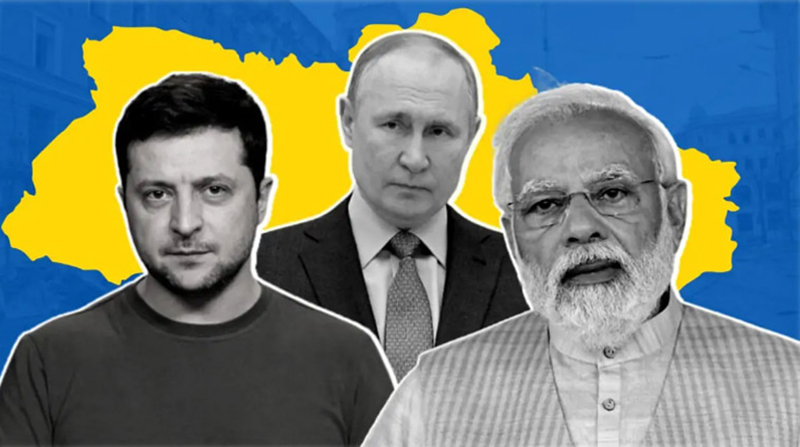 Ukraine
Ukraine India’s ascendancy: Playing a pivotal peacemaker role in the Ukraine-Russia standoff
Ever since Russia’s military offensive began in Ukraine in February 2022, escalating into an entrenched armed conflict, Prime Minister Narendra Modi of India emerged as a pioneering voice of reason on the global stage.
He promptly appealed for the cessation of hostilities and the initiation of peace talks, becoming the first world leader to do so.
The strategic dialogue was extended to both Russian President Vladimir Putin and Ukrainian President Volodymyr Zelensky, seeking a balanced approach at a time when the US and its allies were vocally supportive of Ukraine against Russia. India adopted a stance that acknowledged the concerns of both warring nations from the conflict’s inception, challenging the revival of a Cold War mindset in a post-USSR world.
The continuation of the conflict into its second year has seen China gain relevance as a critical stakeholder in the dispute. Chinese President Xi Jinping’s actions in this continuing military confrontation have caused a stir among strategic analysts globally. Initially asserting a stance of ‘principled neutrality’, China has increasingly underscored a ‘political solution’ to the Ukraine crisis, aligning itself firmly with Russia.
Xi Jinping’s meeting with President Putin in March 2023 bolstered China’s commitment to peace talks. Simultaneously, it navigated the geopolitical turbulence from the intensified polarisation between the US and Russia, stemming from Cold War-era sentiments. The Chinese position resonates with India’s framework for peace, underscoring respect for sovereignty and criticising unilateral sanctions.
The call for a cessation of hostilities and the admonition to abandon Cold War mentalities reflect a balanced approach. China, like India, stands firmly against the usage of nuclear weapons and has highlighted the importance of maintaining grain supply chains and industrial processes, outlining post-war reconstruction as a critical aspect of the peace negotiations.
India hopes for Russia’s contribution to post-war Ukraine as a gesture of goodwill. It also insists on Ukraine’s reaffirmation of its democratic values, in particular, the principle of ‘one person, one vote’, to soothe its Russian-speaking minority. Furthermore, India seeks Ukraine’s assurance that it won’t seek NATO membership, prerequisites that would facilitate discussions on the withdrawal of Russian troops from Ukraine.
This ongoing conflict has laid bare China’s global strategy. President Xi Jinping, while fortifying China’s military might, is keen on retaining geopolitical stability to continue China’s economic expansion. The Belt & Roads Initiative (BRI) and the pursuit of the Maoist doctrine ‘two steps forward, one step backward’ in situations like the Sino-Indian border dispute, align with Sun Tzu’s axiom of ‘winning a war without fighting’.
Within the Ukraine-Russia military conflict, Xi Jinping has balanced China’s alliance with Russia while criticising the US-led West, opposing India’s Quad membership, and extending influence in West Asia, the Gulf, and Eurasia. This consolidation of power coincides with the Communist Party Congress’s move to enshrine Xi Jinping’s ideologies into the party’s constitution and the lifting of presidential term limits, indicating Xi’s pursuit of lifelong leadership.
In the face of this emerging superpower, India’s strategic approach remains robust: building military strength to counter Chinese aggression and harnessing multilateral forums to curtail China’s influence.
Throughout this conflict, the world has witnessed the West’s fervor to arm Ukraine against Russia and isolate Russia geopolitically. However, it’s imperative to consider the human suffering caused by this conflict, a point underscored by Prime Minister Modi. As the world’s largest democracy and current G20 president, India is uniquely positioned to facilitate peace negotiations between the warring nations, a move supported by the global community.
India should not forfeit this strategic advantage over China, and a track-II initiative under the NSAs of India, Russia, and Ukraine would be a prudent start. The resolution of this conflict hinges on the understanding and addressing the concerns of both sides and fostering peaceful co-existence.
Reverting to Cold War-era confrontations does not serve the international community’s best interests. The global community must recall that nations like Russia and Ukraine could co-exist peacefully post-Cold War when free from external interferences.
By initiating peace negotiations, India would stand on a high moral ground, reflecting its role as a global peace advocate. Even if the talks were to take longer or proceed in uncertain directions, India’s position remains unshaken.
Of crucial note is that India’s strategic friendship with the US continues to grow, notwithstanding India’s impartial stance on the Ukraine-Russia conflict and deep ties with Russia. With the continuous rise of Prime Minister Modi’s influence on international platforms, India’s advocacy for world peace remains steadfast and globally respected.
(Image and text credit: Khalsavox.com)
Support Our Journalism
We cannot do without you.. your contribution supports unbiased journalism
IBNS is not driven by any ism- not wokeism, not racism, not skewed secularism, not hyper right-wing or left liberal ideals, nor by any hardline religious beliefs or hyper nationalism. We want to serve you good old objective news, as they are. We do not judge or preach. We let people decide for themselves. We only try to present factual and well-sourced news.







